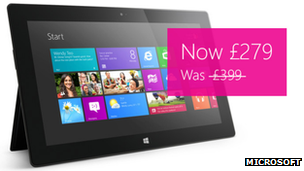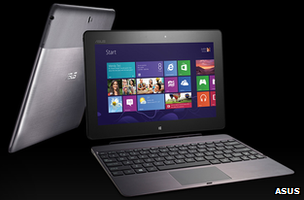Microsoft reveals Surface tablet sales figures
- Published

Microsoft has cut the price of its Surface RT tablets, reducing the value of its unsold stock
Microsoft has revealed that sales of its Surface tablets totalled $853m (£562m) in their first eight months on sale.
The figure suggests the company may struggle to make a profit out of the product.
It has booked a $900m write-down on the value of unsold Surface RT stock after cutting the device's price.
Its latest financial filing also notes that its advertising budget swelled to promote the machines.
The filing says the Windows Division's sales and marketing expenses were $843m higher in the firm's last financial year than the previous one because of the launch of the Surface tablets and new Windows operating systems.
According to the Verge news site, external chief executive Steve Ballmer told staff that "we built a few more [Surface RT] devices than we could sell", last week. The firm recently cut the price of the machines by 30%.
The RT designation refers to the fact that the tablets are powered by an ARM-based chip and offer a limited version of the Windows 8 experience.
Users are restricted to running built-in apps or ones downloaded from the firm's own Windows Store. This means they are unable to run titles such as the the full version of Photoshop or the game Bioshock Infinite.
However, the RT versions of Surface are cheaper than the Pro models which are powered by Intel-made chips and run the full Windows 8 OS. The RT editions are also offer thinner, lighter and offer longer battery life.
Many industry watchers have suggested Surface RT tablets were designed to appeal to consumers tempted by iPads or Android-based models, while the Surface Pro was meant to compete with laptops
Legacy software
Microsoft caused surprise when it first revealed it would make its own Windows hardware.
Taiwanese firm Acer said it put off plans to launch its own RT devices because of the competition it would face from the Surface product line.

Asus indicated sales of its VivoTab RT products had been limited because they do not run legacy apps
The move was also reported to be the reason Hewlett Packard, external decided to make devices running either the full version of Windows 8 or Google's Android OS, but not RT.
Another firm, Asus, did decide to make RT-powered versions of its VivoTab hybrids.
But on Tuesday its chairman, Jonney Shih, told the AllThingsD news site, external that "the result is not very promising" adding that people still wanted to use a lot of classic Windows software that is not compatible with the platform.
"The problem Microsoft has is that the Surface tablets still aren't as cheap as many of the Android ones out there, and they can't compete with the iPad when it comes to the variety of apps," said Benedict Evans, a tech expert at consultants Enders Analysis.
"The one advantage that Surface has is that both versions of the tablet run Microsoft's Office suite of software - but the programs are still not as touch-optimised as they could be, and the kind of people they would appeal are likely to be more tempted by a laptop.
"While I think the concept of Windows 8 on a tablet will survive, RT might not because you're asking people to buy into a new ecosystem which doesn't support legacy software."
- Published18 July 2013
- Published15 July 2013
- Published31 October 2012